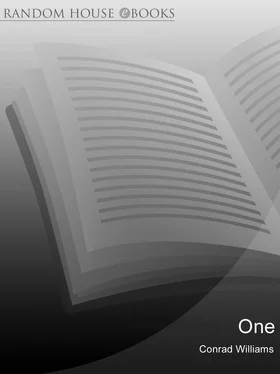Jane reached into the car, hands shaking, and tried not to look at the woman any more. He was glad of his face mask, that he didn't have to smell her. He turned the key, but, as he expected, there was no response from the engine. Backing away, he swung his gaze north, wondering if he should head up to Aberdeen, but his initial impulse was to find immediate shelter, maybe a phone that still worked. Maybe a car or a motorbike. He followed the road south and his heart lifted to find a row of pretty cottages behind a bluff of land. A small harbour with a surrounding stone wall. Small boats had become driftwood. There were bodies in there too, face down. He wasn't sure if he should be grateful for that.
At the first of the stone cottages, he peered through the window, but there was nobody to be seen. He knocked on the door and the sound startled him. The skin on the back of his hands was striated, as if he had thrust it into a bed of thorns. Nobody was coming to answer. It didn't matter how many doors he tried. He rested his forehead against the blistered wood for a second. Closed his eyes. He went around the side of the house to the back. He climbed over the fence into a neatly tended garden. The lawn was a fried brown square. Washing on a line was pitted and scorched. A man was on his knees, toppled over against a chimney pot that contained a plant now little more than a few black tongues. The man's left hand was distended; blood had flowed and dried around the vanishing tourniquet of a watch strap. His fingers were purple, swollen and shiny like baby aubergines. Attached to a kennel by a chain, a peeled thing with too many teeth lay on its side, flanks scorched down to purple bone.
Jane strode past the man and pushed open the back door. The kitchen was halved by light that no longer existed. Whatever had torn across the coast had left an impression of itself here, like the discoloration that sunshine creates on the cover of a forgotten book on a windowsill, only much, much more swiftly. The dining table was a duotone of caramel and coffee. The plastic jug of a fruit-juicing machine had turned into a molten Dali nonsense. Envelopes on the table showed him where he was: Burnmouth, Berwickshire, which he knew to be a good 200 miles south of Aberdeen.
He moved through the house, checking each room, but he didn't know what he was seeking. He saw the shape of a child's bed in a room painted blue but did not dare look inside. Something wrong with whoever lived here. Inhalers and gas cylinders and endotracheal tubing. Tube holders like dog muzzles. Rows of medicines. Bleak textbooks. Volumes of hope.
On a table in another bedroom lay a book of photographs. Smiling faces. Oblongs of love protected by cellophane. A wasting girl in a white hospital gown. Eyes weighted with dark underscores. A smile fought for.
He checked with his fingers for the photographs of Stanley in his wallet but could not bring himself to produce them. It was enough to know they were there.
He felt a moment of mild panic when he thought of his parents. They were in their seventies, living in an industrial town in the north-west. Both were succumbing to the kind of low-level health problems that had increased the number of pillboxes in their bathroom cabinet and visits to the GP's surgery. Both had talked to him, casually, almost in passing, of what he should do if and when. They had set up a trust fund for Stanley. Ash in a vault, now, perhaps. He suddenly felt that he ought to go to them first; they were nearer, they were his parents. Whatever had burned this part of the east coast might have been pegged back by the Pennines. But no – Stanley had to be his priority. Either his parents were alive, or they were dead. He couldn't think that way of his little boy. Stanley had survived this. He must go to him.
There was a bookshelf in the hallway. Volumes about birds of prey. A plate of keys. Maps. He sifted through them and found the village. At the top of the cliffs overlooking the harbour, the East Coast Main Line railway and the A1 ran parallel to each other, south along the Berwickshire coast.
He picked up a phone and put it to his ear but he was no longer listening. Downstairs he opened the refrigerator and checked the contents. Everything was spoiled. He picked through the tins in the cupboard and put some of them in his rucksack. He wanted to spit out the regulator; the synthetic sound of his own breath was a constant reminder of how close he was to losing it. It was too early to see if the ambient air was breathable, but he would have to find fresh tanks soon or prepare himself for an experiment.
Jane went back outside and broke the lock on the shed. Inside he found pricking pots containing seeds that would never come on, a couple of poorly maintained gardening tools and a metal box filled mainly with Rawlplugs and drill bits whitened by masonry. A dusty table with thin legs bore a pile of papyrus-dry Sunday supplements and a coffee cup with the legend No. 1 Grandpa . There was a bicycle with dribbling tyres. In a drawer he found a combination lock, a bottle holder and a bracket, and an anti-pollution mask with a packet of replacement filters. He pocketed these and stared at the shelves on the wall, the tools on the shelves. Nothing of any use. Nothing he knew how to use well enough to make it useful. He stared through the cracked, foxed window into the garden, and the dog and the man were softened to a point where they might still be alive. The man finishing off a little work on his hosta; the dog stretched out, enjoying a snooze. If he stayed here long enough maybe he could will the world back into true. Going back outside could only lead to more awful discoveries.
He closed the door and stood in the lane. He kept thinking of the man in the garden. No. 1 Grandpa . He imagined a daughter and her child coming to visit and finding him like that, roasted to the bone. He went around the side of the house to the garden and retrieved a spade from the shed. He dug a grave. It took a long time. By the end of it he was sweating so much he could not get a sense of his own skin. His breath churned through the regulator; perspiration pooled in his diving mask.
He dragged the old man to the lip of the hole and drew him into it as gently as he could. He hesitated, the spade in his hand, before arranging the dog alongside him. Then he filled in the hole and smoothed the earth flat with the blade. He stared at his work, his raw fingers gripping the ash timber handle. He felt eyes on him, a heat on his shoulders, but when he turned the windows were empty. Just the eyes of the house then. Just the enormity of what had happened, massing.
Jane walked along the front of the other cottages, cupping his hands to the glass where it wasn't broken in order to see inside. Only in the last house in the line did he see anybody in the living room, a woman in an armchair, her body swollen into it as if she were a pile of badly fitted cushions. Her head was tilted back so he could only see the inverted V of her chin. He left the street and walked past a small roofed bus shelter and a red postbox on a wooden pole. He began the long steep ascent of the road to Upper Burnmouth and concentrated on his boots, one foot in front of the other. He had not eaten for some time. Fainting here might be the last thing he ever did.
At the top of the cliff the ribbon of the road held hands with the railway as far as he could see. The rails had buckled in places. No birds, no cats, no dogs. He stared at the village and thought about why he had survived. Something had roasted the face of the Earth while he'd been at the bottom of the sea. So what had saved him? Water? Then why so many dead fish? Depth, then. That must have been it. He knew, talking to some of his mates on the rig, that this area of the coast had been a popular landing point for smugglers. The precipitous cliffs and numerous inlets were a blessing to boats bringing in contraband. The place must have been riddled with cellars and secret tunnels. Maybe some were deep enough to survive in. At the very least he might find a serviceable bike.
Читать дальше












